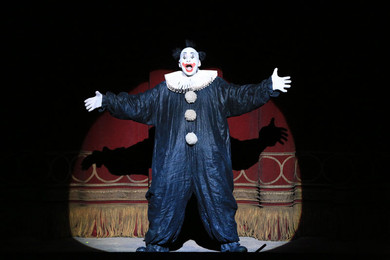14 December 2014
Play Within a Circus

Rigoletto was last produced at the Bolshoi Theatre in 1989. A traditionally sound production, it did not become a talking point and was soon dropped from the repertoire of the vast stage at the Kremlin Palace of Congresses where, at that time, the Bolshoi Theatre Company regularly appeared. Now, a quarter of a century later, the picture looks somewhat different. The Bolshoi is presenting a production which has already made the headlines at many European opera houses. This Rigoletto is the result of the collective efforts of the famous Aix-en-Provence Opera Festival and of four major European opera houses — Opéra national du Rhin (Strasbourg), Théâtre de la Monnaie (Brussels), Le Grand Théâtre de Genève, and the Bolshoi Theatre (Moscow). The scale of the project, of course, demanded the highest standards. And invited to head it was Robert Carsen, one of the world’s most sought after, discussed and innovative opera producers.
The vast vortex of passions which burn out the truly Shakespearian-like hunchback-jester, Rigoletto, with his unscrupulous ploys, tragedies and complexes do not make the opera, one of the most popular in the world, easy to give form to on stage. The producer has to back up the emotional vocal line with adequate mis-en scènes, while at the same time consistently setting forth the clearly delineated plot moves, including choice of locale in which the action unfolds. The history of opera has witnessed both virtually static interpretations which did not get in the way of the singing, and those in which there was a fundamental change in the suggested circumstances, in an attempt to capture the spectators’ interest by an unusual, though optional, environment. Such approaches are not for Robert Carsen who always undertakes radical attempts to invest an opera with additional meanings, not simply by effecting change in time or place of action, but in order to make his audience indulge in a bit of personal soul-searching. He produced his last Don Giovanni (a La Scala production, presented two years ago at the Bolshoi Theatre) according to the play within a play principle with a real mirror, in which auditorium and audience were reflected, running right across the back of the stage, yet the audiences had to be convinced that the play they were watching was absolutely true to life and contemporary. The action of his Rigoletto unfolds in a circus. While, on the one hand this is in keeping with the profession of the Verdi hero, on the other it also represents a metaphor with many meanings.
Thanks to the interference of the censors this opera, after motifs of the Victor Hugo play Le Roi s’amuse, lost both the French king as chief character (he was replaced by the Duke of Mantua) and the corresponding scale of court life and, as a result, Verdi, who regarded the libretto as being the best of all those he had worked with, was able to concentrate on the psychological drama undergone by the characters and in a chamber ‘surrounding’ convey it with even greater vividness.
This time the Bolshoi Theatre is presenting Rigoletto in a more compact venue — its New Stage. Incidentally the first stage on which this production had its première — the open air theatre in the former garden of the Archbishop’s palace in Aix-en-Provence, was extremely small and crowded which worked in favor of the director’s decision to drop the multiplicity of places of action and to concentrate it totally at the circus.
The première series of performances will take place on 14 and 16-21 December.
The opera will be conducted by Evelino Pidò, the Italian maestro, acknowledged to be one of the best interpreters of the French and Italian repertoire, and who collaborates with the world’s leading opera houses. The famous theatre designers of Roumanian origins, Miruna and Radu Borezescu have often worked with Robert Carsen in both opera and theatre. Miruna Borezescu passed away in April of this year and her Rigoletto costumes were to be one of her last creations. Singing the lead role are the famous, and to Bolshoi audiences too, artists — Dmitris Tiliakos who made his Bolshoi Theatre debut in 2010 singing the title role in Don Giovanni, and Valery Alekseyev, who at the Bolshoi has sung the title role in Mazeppa, Ruprecht in The Fiery Angel and Prince Nikita Kurlyatev in The Enchantress. Both soloists have a mass of Verdi roles in their repertoire and appear at the world’s leading operatic venues. Singing the Duke are the young soloists Fabrizio Paesano (Italy), Pavel Baluzhin, a Bolshoi Theatre Young Opera Programme artist, and Sergei Romanovsky, who several years ago embarked on a successful international career and has already appeared at the Bolshoi in Richard Strauss’s Der Rosenkavalier. Gilda will be sung by the Bolshoi’s Young Opera Programme graduates — Venera Gimadieva, one of the Company’s leading soloists who has already acquired world fame (having appeared at the Paris Opéra, Glyndebourne, La Fenice and elsewhere) and Nina Minasyan, as well as the Bolshoi Young Opera Programme student and winner of prestigious international competitions, Kristina Mkhitaryan and Anne-Catherine Gillet who hails from Belgium. It was at the Opéra Royal de Wallonie in Liège that Gillet’s career took off and today she appears at all the leading French opera houses, as well as in Belgium, Switzerland and elsewhere.
Submitted on 14 December 2014, Sunday

